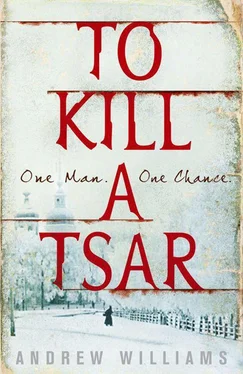The porter pointed to the door of the first hut.
‘That’s Department 10? Are you sure?’
‘Yes.’
Hadfield knew a little of its reputation from a Russian colleague who had threatened him in jest with exile to Siberia or worse — Department 10. Knocking at the first hut, he was greeted by an oath then the scraping of a key in the lock. The door was opened by a ruddy-faced man in his early sixties with the broken veins and bloodshot eyes of a heavy drinker. He was wearing a faded green army uniform, the jacket stained with food and unbuttoned to the waist. He took Hadfield in at a glance.
‘Ryabovsky, Your Honour. Fyodor Ivanovich.’ He made a low insincere bow. ‘Warder, porter, nurse and general dogsbody.’
There was an insolence in his manner that made Hadfield’s hackles rise. ‘Where are the patients?’ he snapped.
Ryabovsky turned to the inner door behind him and unlocked it with a key that was hanging from the chain on his belt. Even before it was fully open, Hadfield was revolted by the overpowering smell of stale urine. Reaching for his handkerchief, he stood in the doorway, his eyes slowly adjusting to the gloom. By the light of a single oil lamp he could see the hut was laid out as a ward, but in place of beds the floor was strewn with rough straw mattresses. And it was heaving with bodies, young men for the most part, military coats fastened over dirty hospital gowns. The plank walls were caked in soot and smoke hung thick about the hut, although the two primitive stoves that were the only source of heat were unlit.
‘Who are these men?’ he asked, turning again to Ryabovksy.
‘The war with Turkey. They’re sick in the head.’
‘Why don’t these men have proper beds?’ It was a sordid unsanitary scene that brought to his mind an engraving of the hospital at Scutari twenty-five years before.
Ryabovsky gave a careless shrug: ‘Perhaps no one knows what to do with them, Your Honour.’
Frightened faces, empty faces, hollow faces, half-dressed, bare chilblained feet, some with dirty bandages or undressed bed sores, some curled tightly into whimpering balls like children, others defiant. Hadfield stepped among them, stopping to examine those with symptoms of a condition he was qualified to treat, but most were beyond his help. Perhaps they were lucky not to have been shot. He had read enough of these strange war injuries to know there was precious little sympathy in the army for casualties like these. He knew what Anna and Evgenia would say: ‘Fool! See how the tsar treats his most loyal servants.’
‘And is it the same in the other hut?’
‘A few less, Your Honour.’
‘This is a disgrace!’ Hadfield spat the words at Ryabovsky. But the old man merely shrugged again.
Hadfield was still shaking with rage five minutes later as he stood among the brambles in the boiler-house garden, the June sun warming his back. Cross with the army for neglecting the men, and with the hospital authorities, but cross most of all with his medical colleagues for making a joke of such a place. But he knew too that if he confronted them they would give him a very Russian shrug of resignation. ‘How can you be surprised?’ they would ask. ‘Such places exist in Russia. What would you have us do?’
The superintendent’s suite was on a bright first-floor corridor above the main entrance. It was the one place in the hospital that did not smell of ammonia or boiled cabbage but of floor polish and gentleman’s cologne. Military clerks in immaculate green uniforms glided from panelled room to panelled room through perfectly weighted mahogany doors that swung silently to behind them. It was as remote from the day to day business of the hospital as his uncle’s ministry.
‘Have you an appointment?’ the superintendent’s secretary asked. ‘As you can see, Doctor, there are others waiting.’ He turned to indicate two uniformed public servants and an elderly man in a frock coat whom Hadfield had seen in the corridors of the hospital and knew to be a surgeon.
‘It is a matter of great urgency,’ Hadfield replied calmly. ‘One that affects the reputation of the hospital.’
The secretary frowned. ‘May I suggest you go through the usual channels, Doctor, and speak to your head of department?’ This was clearly meant to be his final word on the matter. Turning to the surgeon, he opened his leather-bound file and was on the point of handing him an official-looking letter when Hadfield gripped him firmly by his upper arm.
‘I really think you should speak to him,’ he said, tugging him to one side. ‘Believe me, you’ll regret it if you don’t.’
‘Why will I regret it, Doctor?’
‘You know, of course, that my uncle, General Glen, is a good friend of the superintendent’s?’
He had promised himself he would never use his uncle’s name for advantage but he had to admit to a quiet satisfaction as the supercilious expression on the secretary’s face changed in the blink of an eye.
‘Of course, of course. I understand.’ The secretary’s words pattered like gentle rain.
‘And did reason prevail?’ Dobson asked.
Exhausted, Hadfield had collapsed into one of the leather smoking chairs in the correspondent’s office at a little after six o’clock that evening. He was still angry, but satisfied too that a day of frantic activity, of threats, flattery and cajoling, promised to make a difference to the lives of seventy very sick men.
‘Not reason. Nepotism and naked self-interest. And you know, George,’ he said, as Dobson pressed a glass into his hand, ‘I was surprised by my own mendacity.’
Dobson laughed. ‘You’re an educated man, Hadfield. You used the weapons available to you for the benefit of those men. Besides, there is nothing you can teach a public servant in Russia about lying he doesn’t already know. ’
‘But where does one draw the line?’ Hadfield had spoken to the superintendent of public scandal, of a friend on the St Petersburg Gazette who was pursuing a story on the treatment of casualties in the recent war. He had mentioned a confidential visit his uncle was hoping to make to the hospital with other members of the government. And he had told the bucolic old superintendent that the general had told him a prominent member of the royal family had expressed his concern.
‘I even mentioned the foreign press and my friend on The Times .’
‘You snake,’ said Dobson with a short barking laugh. He took a cigarette from a silver box on his desk, lit it then flopped into the armchair opposite Hadfield. ‘And what is going to happen to Department 10?’
The superintendent had promised beds and nursing care, that he would gradually transfer the men to the body of the hospital and contact their families. ‘And those who do not recover will be moved to an asylum — although I suppose that will be like jumping from the frying pan into the fire.’
‘But you’ve done what you can,’ Dobson replied, leaning forward with the wine bottle to fill Hadfield’s glass. ‘And risked a good deal to do so.’
‘Not really.’
‘Well, what about good relations with General Glen? It would be unwise to rub him up the wrong way. You will forgive me for saying so, I hope, but your uncle is not a man to cross.’
It was rumoured the general was pursuing newspapers that had the temerity to criticise his stewardship of the empire’s finances and that the censor was on the point of stepping in to suppress further adverse comment. ‘At least the general has helped you do a good turn, even if he is threatening to put the rest of us out of our jobs,’ he said with a cheerful twinkle.
It was entirely typical of Dobson to find humour and the kernel of something positive in even the grimmest of situations. In a relatively short time, he and Hadfield had become friends. They were much the same age, Englishmen who considered Russia to be home, they shared a passion for the language and a fascination with the people and their customs. Dobson had taught himself Russian, then persuaded The Times to accredit him as a war correspondent, and had reported with distinction on the recent conflict with Turkey. His father owned a small cotton mill in one of the new manufacturing towns in the Midlands. Less fortunate in his education than Hadfield, he had more than made up for his shortcomings by becoming a ruthless autodidact. He was a little on the plump side, but his flabby good-humoured face and high forehead leant him a certain ageless quality. One of the second secretaries at the embassy had likened him cruelly to Mr Pickwick. But anyone who took Dobson for a gull was a poor judge of character. He was not only resourceful but determined, with a reputation at the embassy for clinging to a story like a ferret to a rabbit. In politics, he was a new town liberal, in favour of universal suffrage for men but not for women, an admirer of Mr Gladstone and a passionate supporter of a free press. In his column for The Times , he was a discreet critic of Russia’s despotic government but had no time for ‘nihilists’ or ‘socialist revolutionaries’. As they sat in the correspondent’s comfortable study, surrounded by piles of Russian newspapers, books and maps, and his prints of Petersburg, Hadfield wondered what his friend would say if he knew the sort of people he had been consorting with at the clinic. A little heady after two glasses of wine on an empty stomach, he was almost tempted to confide in him, but Dobson would speak sharply to him of the risk he was running, would advise having nothing further to do with Anna and the Figners and might even suggest reporting Goldenberg to the police: in the end he chose to keep his counsel.
Читать дальше












